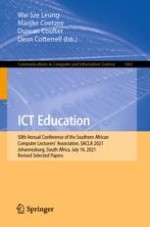2022 | Buch
ICT Education
50th Annual Conference of the Southern African Computer Lecturers' Association, SACLA 2021, Johannesburg, South Africa, July 16, 2021, Revised Selected Papers
herausgegeben von: Prof. Wai Sze Leung, Marijke Coetzee, Duncan Coulter, Deon Cotterrell
Verlag: Springer International Publishing
Buchreihe : Communications in Computer and Information Science
